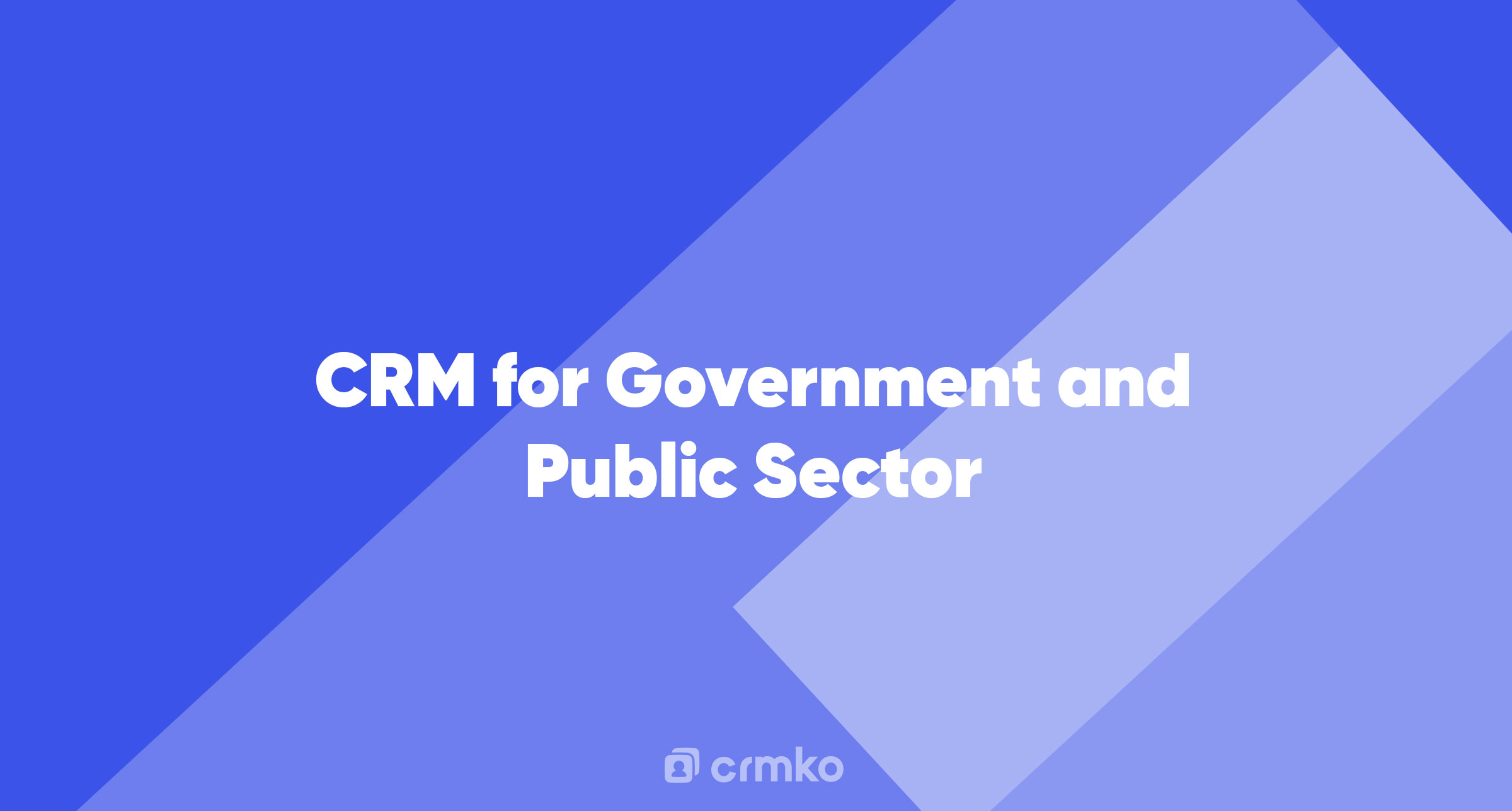Have you ever wondered how government agencies can improve their operations and enhance their interactions with citizens? The answer lies in adopting Customer Relationship Management (CRM) software tailored specifically for the public sector. In this comprehensive guide, we will delve into the benefits and functionalities of CRM for government and public sector organizations. Discover how CRM systems can streamline administrative processes, enhance efficiency, and ultimately improve citizen satisfaction and engagement.
Understanding CRM for Government Agencies
The concept of CRM, traditionally associated with the private sector, holds immense value for government agencies. In the context of the public sector, CRM software allows organizations to manage their relationships and interactions with citizens, businesses, and other government entities. It provides a comprehensive set of tools, technologies, and methodologies to analyze, improve, and streamline these interactions.
A government CRM solution integrates various functions into one system, including contact management, data analysis, document management, workflow automation, and reporting capabilities. By enhancing the quality of interactions with the public, CRM systems can boost citizen satisfaction and cultivate trust in public sector operations.
The Benefits of CRM for Government and Public Sector
Implementing a CRM system in the government and public sector offers a wide range of benefits that can transform service delivery and citizen engagement. Let's explore some of the key advantages:
1. Enhancing Operational Efficiency
One of the primary benefits of CRM in the government and public sector is the automation of tasks that drive efficiency. By automating workflows, scheduling, and communication, agencies can streamline administrative tasks and reduce the time spent on manual, repetitive work. This allows staff members to focus on more critical tasks and decision-making, ultimately improving overall operational efficiency.
2. Elevating Citizen Engagement
A good CRM system empowers government agencies to elevate their citizen engagement and relationship management levels. Just as businesses have been using CRM software to manage their contacts, build relationships, and schedule follow-up connections, governments can now do the same. A citizen-centric CRM solution facilitates seamless, relevant, and timely communications with community members.
CRM systems also enable the establishment of self-service offerings, where citizens can access information, make requests, and resolve issues through digital channels. This proactive approach empowers citizens, builds trust, and reduces the burden on agency staff.
3. Streamlining Procurement Processes
Long procurement processes have been a challenge for many government agencies and contractors. However, a CRM system can help smooth the flow of information and communications between stakeholders, ensuring projects are commissioned and delivered expediently. By streamlining procurement processes, public opinion of the local government will increase.
4. Improving Recruitment and Employee Retention
Cloud-based CRM platforms support and integrate with self-service applications that act as portals for hiring managers and applicants. This allows for the efficient management of job postings, applications, candidate screening, and even making offers through a single intuitive interface. Additionally, CRM platforms provide employee engagement and productivity tools that enhance employee satisfaction and retention.
5. Strengthening Data Security and Privacy
Data security and privacy are paramount, especially for government agencies handling sensitive personal data. CRM systems come equipped with robust security features and protocols to ensure the secure storage and management of personal data. Leveraging these capabilities, government agencies can store, manage, and access data securely while providing the safety assurance constituents need.
6. Reducing Operational Costs and Enabling Scalability
Implementing a CRM system can result in significant savings by consolidating data storage, security, workflow management, and communications into one platform. This consolidation reduces the costs associated with maintaining multiple systems and enables government agencies to scale their operations efficiently.
7. Interactive Communication Tools
CRM systems provide modern, interactive communication tools that enable efficient and timely communication with citizens. These tools automate and track communications, ensuring timely responses and follow-ups. From emails and newsletters to surveys and notifications, CRM tools provide an effective means to engage citizens, gather feedback, and build stronger constituent relationships.
8. Holistic Views and Reporting for Data-Driven Decision Making
CRM systems have the ability to track and analyze data from various sources within the organization, providing holistic dashboards that showcase constituent interactions and performance metrics. By consolidating data from individual citizens, government contract holders, staff, partners, and stakeholders, agencies gain insights into trends, service demands, and top constituent issues. This data-driven decision-making approach enables more effective forecasting, streamlined procurement processes, and enhanced citizen satisfaction.
Choosing the Best CRM for Government Agencies
When selecting a CRM solution for government agencies, several considerations should be made:
- Align on Objectives: Clearly define the specific objectives your agency aims to achieve with CRM implementation, such as improved citizen communication, workflow automation, or data security.
- Ease of Use: Look for a CRM system with an intuitive and user-friendly interface that both staff members and citizens can navigate easily. Consider the customization options available for creating a streamlined customer portal.
- Data Security and Compliance: Ensure that the CRM solution aligns with government data security and privacy regulations. Look for features such as encryption, access controls, and audit trails to protect sensitive citizen data.
- Integration Capabilities: Assess the CRM's ability to integrate with existing systems and applications used by your agency. Seamless integration allows for a more comprehensive view of constituent interactions and improves efficiency.
- Scalability and Flexibility: Choose a CRM system that can grow and adapt with your agency's changing needs. Consider the platform's scalability to accommodate increased data volume, user base, and future technological advancements.
Conclusion
CRM software is revolutionizing the way government agencies interact with citizens, streamline operations, and enhance overall efficiency. By adopting CRM systems tailored for the public sector, government agencies can improve citizen engagement, automate processes, ensure data security, and reduce operational costs. With the right CRM solution in place, government agencies can meet the demands of the digital age and provide citizens with the exceptional service they deserve. Choose a CRM platform that aligns with your agency's objectives, offers ease of use, data security, integration capabilities, and scalability to propel your agency towards a more citizen-centric future.
